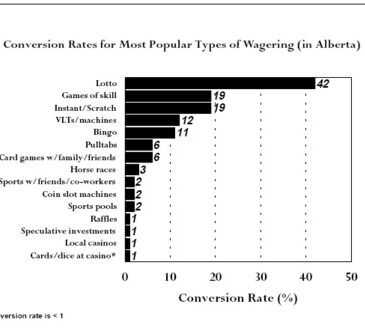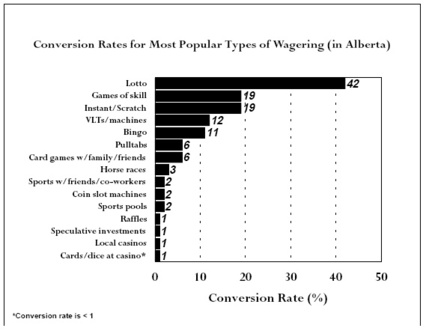Several observers of gambling have referred to instant games as the “crack-cocaine of gambling.” The analogy seems to imply that instant games or other games of chance have the ability to get a player “hooked” on the game. If so, do some games contribute more to causing addiction than other games? Researchers have started examining this question of varying degrees of appeal of certain gambling activities. In Alberta, Canada, Wynne, Smith, & Volberg approached the question in an innovative way by calculating “conversion rates” to assess how likely people are to become weekly players if they have ever tried a gambling activity. The conversion rate is calculated by dividing the number of respondents who say that they gamble at least once weekly on each type of gambling by the number of respondents who have ever tried that type of gambling. The activities with the highest conversion rates are the lotto, games of skill, and instant or scratch tickets. The conversion rates are accurate for what they measure: the likelihood of becoming a weekly gambler on an activity participated in. However, these conversion rates cannot accurately estimate the contribution to the cause of addiction. Some gambling activities (e.g., lotto) are marketed to be a daily activity, while others (e.g., casinos) are considered to be a less frequent activity. In addition, the concept of gambling addiction involves much more than frequency of play. Addiction to gambling is about a relationship to gambling activities. It is conceivable that an individual who plays the lottery daily is not a problem gambler, while an individual who goes to a casino only intermittently could have a gambling problem.
Source adapted from: Wynne, H.J., Smith, G.J., & Volberg, R.A. (1994). Gambling and problem gambling in Alberta. (Report prepared for Alberta Lotteries and Gaming). Edmonton, Alberta: Author.
This public education project is funded, in part, by The Andrews Foundation.





